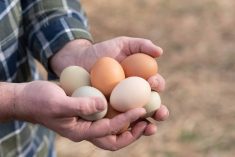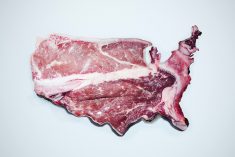Can’t say I was surprised by Ottawa’s response to China’s latest round of revenge-based tariffs on Canadian canola — nor by the canola industry’s response to that response. Were you?
In case you’ve not been following along on our website, Prime Minister Mark Carney on Sept. 5 rolled out a long list of measures, mostly in the usual federal form of eight-, nine- or 10-figure investments over multiple years, to try to “protect, build and transform Canadian strategic industries.” For canola processors, those measures will include amendments to Canada’s Clean Fuel Regulations and “a time-limited production incentive for renewable diesel and biodiesel producers,” in the form of $370 million over two years (January 2026 through December 2027), paid out on a per-litre basis to Canadian producers of biodiesel and renewable diesel, up to 300 million litres per facility. Crushers are also eligible for funds via the Regional Tariff Response Initiative, which was set up in March against Donald Trump’s tariff spree and is now being expanded. One example of eligible costs was for a canola processor to hire sales reps or attend trade shows in diversified export markets.
Read Also

Farm equipment market unlikely to pick up
North America’s farm machinery sales have been slow and uncertain thanks to tariffs and trade disruption. There’s not a lot of hope for change in 2026.
For canola sellers, meanwhile, the feds will put up another $75 million in AgriMarketing funds over five years starting in 2026-27 to boost Canadian agri-foods’ profile in “high-growth areas such as Africa, the Middle East and the Indo-Pacific,” particularly for “sectors most affected by trade barriers, like canola.”
And for canola growers, the interest-free portion of cash advances under the Advance Payments Program will temporarily be doubled to $500,000 from now through the 2026 program year. Now, that increase is specifically for advances on canola — and, as the feds note, canola growers represent about 41 per cent of APP users.
That’s still an understandably underwhelming offer from canola growers’ point of view.
“Farmers should not be expected to borrow their way out of this situation,” Rick White of the Canadian Canola Growers Association says, adding the APP was “not designed to provide the required support canola farmers need under this situation.” And he’s right, of course: interest-free or not, the farmer’s gotta pay that back, out of a canola crop for which he or she is now likely to get less than originally expected.
Like it or not, though, the feds met a long-lowered bar for expectations here. Successive federal governments for about three decades now have been working to get out of the ad-hoc payment business — so whether any existing ag programs fit the bill or not, it’s hardly surprising when the feds try to shoehorn problems into one or more of those. And not even a disaster-based program like AgriRecovery was meant to kick in when a capricious customer, whose buying decisions generally involve market-moving amounts of product, takes offense on an unrelated matter.
Back on the biofuel side: the canola industry says it’s “encouraged there will be some support for biofuel production” but also says the proposed incentive “does not go far enough and will not drive meaningful additional domestic demand for canola.” Further, Canada’s canola group reps say the changes to the Clean Fuel Regulations “provide no clarity on disincentivizing fuels made from possibly adulterated foreign used cooking oil.”
On the used cooking oil issue: fair enough. It’s straight-up logical that any rules on farmed fuels should support nearby domestic production. The alternative is burning tons of diesel to truck in dodgy feedstocks from far away, just to make more fuel, to move more feedstocks, rinse and repeat.
On the demand side, though, I’ll be interested to see whether this incentive is set up in a way that allows not-yet-built Canadian biofuel projects to benefit. I’m thinking, very specifically, of the proposed Regina biofuel plant that Federated Co-operatives shelved earlier this year, and the shelved joint-venture FCL/AGT crush plant that would have fed it.
In the bigger picture, though, I’ll admit I’m disappointed that the feds resorted to biofuel policy as a support for the canola sector here. Since the first Trump administration, when exemptions from U.S. biofuel blending requirements for smaller fuel refineries became a political flashpoint in that country, our southern neighbour has been a cautionary tale about what happens when a domestic farm commodity gets tied too closely to an end-use that exists mainly at politicians’ pleasure. That’s not even to mention the larger ethical issue of burning fuel year after year over limited acres to grow crops to go right back into the tanks of cars, trucks, tractors, combines, trains and planes.
Don’t get me wrong, folks, grow whatever you want. Feed-grade byproducts like DDGs or oilseed meal aside, though, it just seems to me like we’ve lost the plot whenever we start talking about growing crops whose main intended use isn’t food, or even to feed food.
And speaking of politicians’ pleasure, what should happen if the whole trade drama gets resolved by the time you read this? Sometime between when I sat down to start writing and now, federal Ag Minister Heath McDonald went on the record as saying the possible removal or easing of Canada’s tariffs on Chinese electric vehicles (EVs) is “certainly something that we’re looking at” while still keeping other Canadian trade matters in mind.
We know how quickly China can drop its trade barriers once it gets what it wants, so if that somehow comes to pass, will all of Ottawa’s proposed new supports and amendments still even be on the table?
As always, drop me a line with any questions, comments or concerns — or your answers to my questions.
















